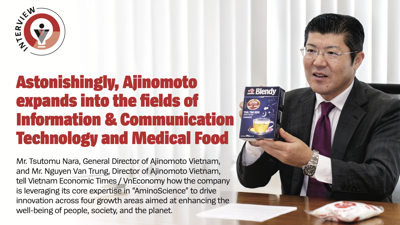Vietnam’s National Brand to be enhanced
Vietnamese products are now found in all four corners of the globe but broad recognition of specific brands requires greater effort.

Vietnam is consistently recognized as being among the world’s most dynamic and open economies, ranking as ASEAN’s fourth-largest and the 40th globally. Amid fierce economic competition, however, brand development remains a challenge for local businesses.
The establishment of a brand requires ongoing, meticulous, and professional effort. Building a strong brand begins with products and services that embody credibility and excellence, and enterprises must also prioritize cultivating a corporate culture with widespread influence.
Few competitive brands
According to UK brand evaluation consultants Brand Finance, Vietnam’s national brand value skyrocketed 102 per cent in the 2019-2023 period; the highest rate in the world. The value of the national brand reached $498.13 billion last year, marking a 15.6 per cent increase against 2022, and has posted double-digit growth over the past five years, ranking it 33rd among 121 strong national brands globally.
The telecommunications, banking, and food and beverage sectors have contributed significantly to the rise in Vietnam’s national brand value. Notably, telecommunications, represented by major brands like Vietnam Posts and Telecommunications Group (VNPT), Viettel, MobiFone, and Vietnammobile, contributed 31 per cent of the total national brand value. Banking and food and beverages, meanwhile, contributed 30 per cent and 12.7 per cent, respectively.
Deputy Minister of Industry and Trade Nguyen Sinh Nhat Tan emphasized that Vietnam’s national brand has solidified its credibility and is increasingly respected in the international arena, showcasing the country’s proactive role and global stature.
Recent efforts by many Vietnamese enterprises reflect a growing recognition of the importance of building a national brand, with significant investments being made in the endeavor. As a result, leading Vietnamese brands have not only significantly enhanced their brand value and strength indices but have also begun to align with global trends. However, challenges persist, including limited resources hindering the development of strong Vietnamese brands, and there remains only a modest number of enterprises fully committed to the mission of brand building.
As a consequence, a distinctive image that represents Vietnamese goods and products remains elusive. Only a few enterprises prioritize brand building and they generally prefer to only register trademarks in Vietnam rather than in foreign markets. Additionally, many overlook brand exploitation and management, resulting in fragmented brand promotion efforts and infrequent appearances of high-value logos. Consequently, several Vietnamese brands have faced challenges with intellectual property protection when entering foreign markets, such as Trung Nguyen coffee and Phu Quoc fish sauce.
For instance, in the rice market, the Philippines represents Vietnam’s largest rice export market, yet Philippine importers seldom highlight Vietnamese rice as prominently as they do for Japanese or Thai rice. Filipino consumers predominantly associate rice with Japanese and Thai varieties, despite consuming significant quantities of Vietnamese rice. This raises a pertinent question: how can Philippine retailers effectively promote “Vietnamese Rice” and instill pride in it?
Mr. Hoang Minh Chien, Deputy Director of the Trade Promotion Agency (VIETRADE) at the Ministry of Industry and Trade, noted that Vietnamese businesses have made considerable strides forward in brand building and development. This progress has enhanced product competitiveness, attracted investments, and fostered international trade growth. Despite these advancements, Vietnam’s economy still confronts numerous challenges, including unsustainable export strategies and international trade disputes that exceed the capacity of individual businesses, sectors, or even regions.
There also remains ambiguity regarding the shift in export structure towards higher proportions of processed industrial products and reduced reliance on raw materials. Added value in products remains modest, partly due to branding issues.
Vietnam is globally recognized for its significant exports, ranking among the top in terms of volumes. However, many of these exports lack strong brand associations, primarily consisting of raw or minimally-processed products. Consequently, Vietnamese products often bear brand names from other countries when exported.
Better branding
Deputy Minister Tan emphasized that in an era marked by rapid change and escalating competition, core values are more vital than ever, bolstered by advancements in technology and AI. These enduring principles guide actions in Vietnam and serve as the bedrock for nurturing and advancing the brands of individual enterprises, localities, and the country as a whole. Successfully cultivating and evolving a brand necessitates identifying distinctive core values.
It also requires active engagement from ministries, sectors, and localities to continually heighten awareness about the significance and imperative of brand cultivation and development, ensuring substantial investment of resources. Furthermore, there is a pressing need to intensify promotional efforts for Vietnam’s pivotal export products and their potential in global markets.
For businesses, leveraging Vietnamese ingenuity in design and product development tailored to market demands and preferences is essential. Investing in technological innovation to sustainably produce high-quality goods aligned with trends in eco-friendly and circular economies is paramount.
Mr. Le Duc Nghia, Chairman of the Board at the An Cuong Wood Working JSC, illustrated this through his company’s successful strategy focusing on direct exports rather than subcontracting, targeting major markets like the US (85 per cent of exports) and Japan (15 per cent), with plans to expand into Canada. An Cuong actively participates in international trade fairs and hosts delegations from the US to visit its facilities, aiming to forge direct connections for orders and bolster its brand presence.
“Investing in our own brand for exports yields significantly higher profits compared to subcontracting, which often results in minimal margins, or worse, breaking even with poor management,” he explained. “To achieve lasting success, businesses must prioritize robust marketing efforts and diligently cultivate their brands.”
Dr. Abel D. Alonso, Senior Lecturer in International Business at RMIT University Vietnam, observed that Vietnam’s major enterprises are strategically embedding and enhancing their core values in brand development efforts. He suggested that effective brand building involves “storytelling” and consistent social media communication, focusing on the emotional aspects and values of products. Maintaining a robust brand presence at events and through networking activities is also crucial.
He also proposed an alternative approach to brand building. For instance, a coffee producer could engage in sustainable farming practices, provide farm-stay accommodation, host coffee-related tourism activities, or share compelling stories about local coffee farmers.
The fundamental principle in brand building is for businesses to convey memorable experiences, images, and narratives while consistently delivering high-quality products and services that align actions with words, Dr. Alonso stressed. He advised Vietnamese businesses to authentically use their Vietnamese identity to share their stories with international audiences, encouraging them to innovate and lead the market rather than merely follow trends.
Ms. Jodie Altan, Associate Pro Vice-Chancellor, Engagement, at RMIT University Vietnam, underscored the need for Vietnam to implement measures that foster and encourage the dedication of Vietnamese entrepreneurs to elevate their brands. She also stressed the importance of harnessing the unique cultural elements of each region in Vietnam to fully capitalize on existing potential.







![[Interactive]: Economic overview - April 2025](https://media.vneconomy.vn/400x225/images/upload/2025/05/06/5a245778-67b1-4874-a8dc-21f8cfed62a6.png)